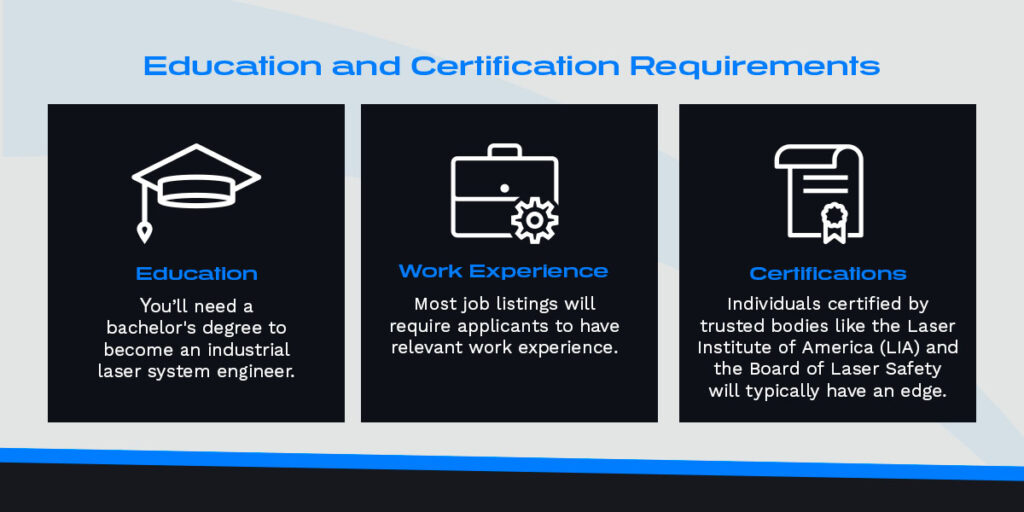
Laser engineering focuses on optical systems technologies that use unique light sources to cut, weld and engrave materials like metals with great precision. Industrial laser engineering has become a much-needed technology facilitating diverse cutting-edge applications in medicine, manufacturing, defense systems, communications and more.
A laser system engineer is a specialist involved in the designing, development and application of laser technologies. In this guide, you’ll learn how to become a laser engineer.
Laser engineers are responsible for many technological advancements across multiple industries today. They drive innovation in many fields. However, the responsibility of each laser system engineer depends on the specific industry and role. These professionals design laser systems to meet the unique needs of their specific applications.
Laser engineering is a well-established field with diverse roles designed to cater to the needs of different industries. It’s common to find laser professionals collaborating with other professionals in manufacturing, healthcare and academics to design and advance laser technologies. Here are the roles of laser engineers:
There are many types of laser engineers specializing in diverse applications across industries. With many specializations, differentiating among them can be confusing. Here are some of the common types of laser engineers:

How do you become a laser engineer? Like other technical professions, you need the necessary qualifications. Here are steps to help you qualify for these careers.
You’ll need a bachelor’s degree to become an industrial laser system engineer. The degree’s focus doesn’t matter as long as it helps you develop the necessary skills for your specific laser field. Common subjects in line with lasers include electrical engineering, optics, physics and other technical fields.
You could also begin your career with a degree in industrial engineering, technology or manufacturing engineering. However, with these general backgrounds, you’ll need more work experience to gain expertise.
If you want to advance in the industry and bypass entry-level work positions, opt for stronger credentials like Master’s or Doctorate degrees. While these are not required, they demonstrate the highest level of education.
Some degrees to consider are laser engineering, photonic engineering and photonic science.
Getting your foot in the door as a laser engineer can be challenging, as most job listings will require applicants to have relevant work experience.
Here are a few methods for getting the experience you need to secure your first role:
Certifications from established industry bodies are an excellent path because they can carry almost as much weight on a résumé as years of work experience. Individuals certified by trusted bodies like the Laser Institute of America (LIA) and the Board of Laser Safety will typically have an edge.
Laser engineers work in diverse environments based on the requirements of their roles and their qualifications. Those with graduate and postgraduate degrees may work in research settings and academia, while others work in more hands-on industrial settings. In addition to laboratories and manufacturing facilities, laser engineers can also work with government agencies and medical centers.
The roles in research labs and academic environments generally involve conducting experiments, developing new technologies, testing systems and instructing budding engineers. In medical centers, laser engineers may work closely with health professionals to develop laser solutions for medical purposes. However, the most common environment for laser engineers is industrial settings, where they design and develop laser systems and oversee laser-based manufacturing processes like cutting and engraving.
The number of people employed in optical/laser engineering jobs in the United States was 177,569 in 2024, with the number expected to surpass 180,000 in 2025.
According to Zippia.com, the national average laser engineer salary was $85,319 in 2024, representing a 4.4% growth from 2023. Despite the national average, the average salaries across the states vary. Laser engineers on the West Coast, in the states of Oregon, California, Washington and Nevada, earn more than the rest of the country. As of 2024, the highest average salary was in California and the lowest in Nebraska.
Laser systems are crucial in multiple industries, spearheading innovation, automation and efficiency. A career in laser engineering is lucrative and fulfilling. As more applications emerge in the industry, opportunities will continue to increase, resulting in job stability and more demand for specialists.
If you’re considering a career as a laser engineer, learning from industry leaders is key. Laser Marking Technologies, LLC is a reputable laser marking and engraving technology manufacturer with over 100 years of combined expertise. Tap into our vast industry knowledge. Learn more about laser systems as you embark on your career!